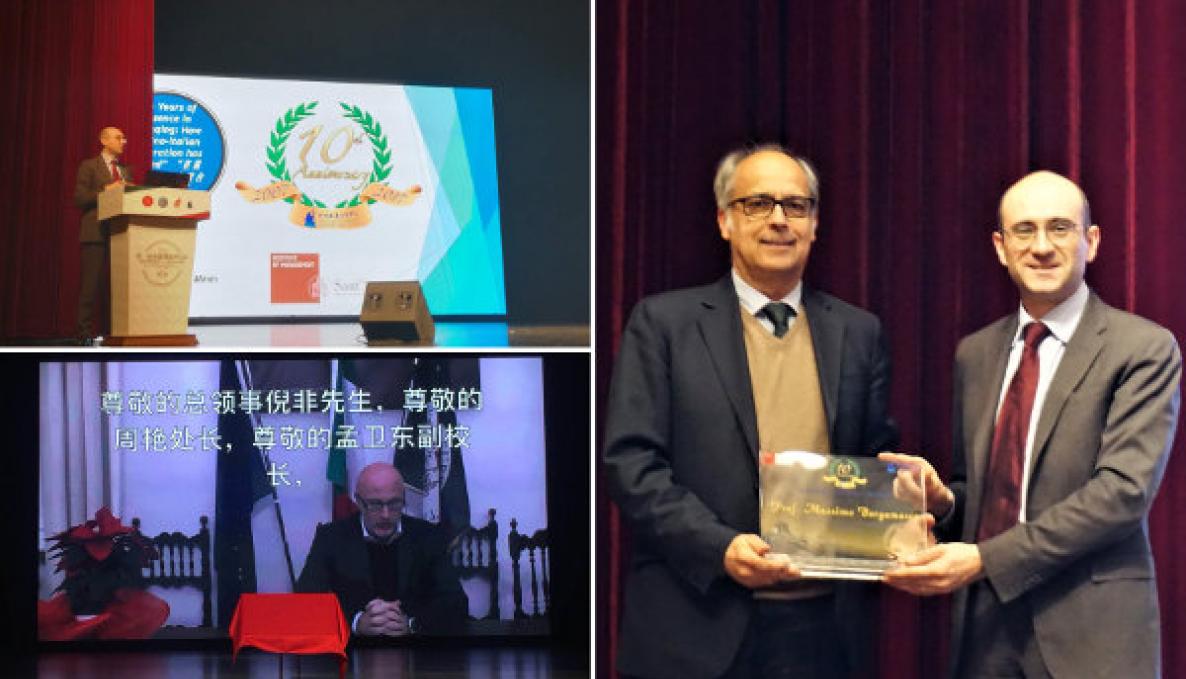ITALY-CHINA PARTNERSHIP: SANT’ANNA SCHOOL HAS PLAYED A LEADING ROLE IN THE DEVELOPMENT OF THE CHONGQING “GALILEO GALILEI” INSTITUTE OVER THE PAST 10 YEARS. NOW WE ARE MOVING TOWARDS AUGMENTED REALITY AND ARTIFICIAL INTELLIGENCE

On 10th December 2017, Sant’Anna School, Chongqing University and the Bishan District authority organized the conference “From the Leaning Tower along the New High-Tech Silk Road: 10th Anniversary of the Galileo Galilei Italian Institute” at the Culture and Arts Centre - Bishan. The Culture and Arts Centre area will house the new laboratory for Augmented Reality and Artificial Intelligence, which will contribute to the vitality of the Galileo Galilei Italian Institute. The conference was sponsored by the Consulate General of Italy - Chongqing, the National High-Tech Zone – Bishan, the Sino-Italian Innovation and Research Institute and the Galileo Galilei Italian Institute.
To celebrate the Galileo Galilei Italian Institute 10th anniversary, Professor Pierdomenico Perata, rector of Sant’Anna School, gave a supportive (video message) opening speech followed by remarks by Alberto Di Minin, professor of Management at Sant’Anna School and director of the Galileo Galilei Italian Institute. Both outlined the importance of the scientific partnership and how these new initiatives are vital in ensuring Sant’Anna School remains a European leader in the field of Augmented Reality and Artificial Intelligence. Professor Alberto Di Minin and Professor Massimo Bergamasco, director of the TECIP (Communication, Information and Perception Technologies) Institute, have played a major role in the development of the Galileo Galilei Italian Institute. They both remarked how artificial intelligence will play an important role in reshaping business and industries such as retail, manufacturing and healthcare. In December, they were awarded the "China-Italy Science and Technology Innovation Cooperation Contribution Award” and the “2017 Galileo Galilei Award” for their highly skilled scientific work and collaborative efforts between universities and enterprising corporates.
Professor Massimo Bergamasco explained the “Transformative Basement” concept at the new laboratory for Augmented Reality and Artificial Intelligence in Bishan where scientists will explore the “Transformative Basement” to test the technology development and the confluence of augmented reality, virtual environment and artificial intelligence. The Laboratory will provide the scientific vision and the logistical organization to set the projects of a new digital reality.
Ever since its foundation 10 years ago, the Chongqing Galileo Galilei Italian Institute has proven to be a center of excellence for the promotion of Italian culture in Southwest China. Over the last decade, investments were made in cooperation agreements improvement and in public–private partnerships to strengthen scientific cooperation.
The conference highlighted the need for partnerships to invest in local institution and capacity building and to include local partners in global partnerships. To support China's global economic integration, the new laboratory can provide an additional platform for a deeper integration and an open global scientific cooperation. Increasing levels of Italy–China cooperation, driven in part by the increased GDP (10.7% in 2016) of Chongqing enterprises, will require more support from institutions. The involvement of Sant’Anna School has shown that Italy and China are willing to deepen cooperation in academic institutions. The Bishan District demand for AI infrastructure will offer new opportunities to ensure digital technology would benefit institutions and companies.
The conference programme offered 3 sessions, covering topics such as the “China-Italy Cooperation for Innovation & Technology Transfer”; “Italian Design: Best Practices for Cooperation with China” and the “Sino-Italian Research and Innovation Areas”. Common to every session was the focus on the resulting impact of new digital technologies and AI.
Key speakers included: Huang Wenjie, member of the Standing Committee -Bishan, Lorenzo Gonzo, Consulate General of Italy- Chongqing, Zhou Yan, director of Science and Technology Dept. - Chongqing; Paolo Bazzoni, Board Member of Chna-Italy Chamber of Commerce - Chongqing; Zhang Yongwu, Mayor of Bishan District, Filippo Nicosia, Consul General - Chongqing, Meng Weidong, Vice President of Chongqing University and Pietro Tonutti, deputy rector for International Relations at Sant’Anna School.
In February 2017, President Sergio Mattarella and President Xi Jinping signed the cooperation agreement designed to support joint research activities in experimental and social sciences for the Bishan Sino-Italian Innovation Base-Camp (SIIB-C). The China-Italy comprehensive strategic partnership becomes "increasingly ambitious and increasingly concrete” as the Galileo Galilei Italian Institute will coordinate the emerging technology and digital projects (including 3-D, VR and AR, AI, data visualization and coding).



